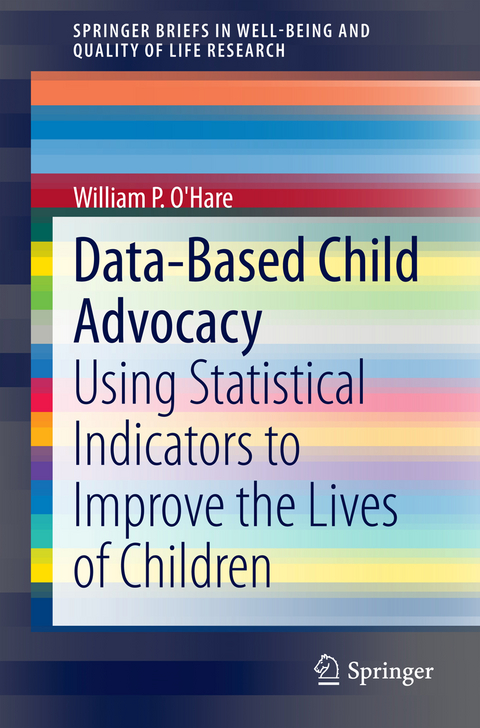
Data-Based Child Advocacy
Springer International Publishing (Verlag)
978-3-319-07829-8 (ISBN)
Dr. O’Hare is a social demographer who has spent forty years using socio-demographic data to increase public understanding disadvantaged groups. For the past 25 years, Dr. O’Hare has been involved with the KIDS COUNT project at the Annie E. Casey Foundation. Most of his professional writing has been for public rather than scholarly audiences. Dr. O’Hare has been an expert witness in more than a dozen lawsuits and has testified in front of Congress several times. He has been quoted in the New York Times, The Washington Post, USA TODAY and many other newspapers. He has a Bachelors of Science and Masters of Arts, and a PhD, from Michigan State University.
Introduction.- 1 What is Data-Based Child Advocacy?.- 2 Types of Advocacy Activity Using Child Indicators.- 2.1 Increasing Public Awareness about Child Well-Being.- 2.2 Making Data on Child Well-Being Easily Available.- 2.3 Advocating for More and Better Data on Children.- 2.4 Child Well-being Monitoring.- 2.5 Goal Setting.- 2.6 Evaluating Programs and Policies.- 3 Development of the Data-Based Child Indicator Movement.- 4 Communication Issues.- 5 Conclusions.- Appendix 1 Data-Based Child Advocacy in Latin America.- Appendix 2. Some Key Questions Regarding Data-Based Child Advocacy Publications.
"Presents a notion of data-based child advocacy for social sciences which is not solely based on an academic proposal, but mainly on the idea of intervention. Moreover, the text has been written with a language that makes it possible to be read by people who are not versed in the specific academic field. Undoubtedly, this is a study that should be taken into account by the actors responsible for the design and implementation of public policies." (Yussef Becher, Applied Research in Quality of Life, Vol. 10, 2015)
| Erscheint lt. Verlag | 1.8.2014 |
|---|---|
| Reihe/Serie | SpringerBriefs in Well-Being and Quality of Life Research |
| Zusatzinfo | IX, 65 p. 1 illus. |
| Verlagsort | Cham |
| Sprache | englisch |
| Maße | 155 x 235 mm |
| Gewicht | 130 g |
| Themenwelt | Studium ► Querschnittsbereiche ► Prävention / Gesundheitsförderung |
| Sozialwissenschaften ► Politik / Verwaltung | |
| Sozialwissenschaften ► Soziologie ► Empirische Sozialforschung | |
| Schlagworte | Advocating for better data on child well-being • Advocating for easier access to data on child well • Advocating for easier access to data on child well-being • Data-based child advocacy • Improving the lives of children • Key principles of data-based child advocacy • Making data on child well-being easily available • Science and Advocacy on child advocacy • use of child indicators in an advocacy context • Using data for goal setting with respect to child • Using data for goal setting with respect to child well-being • Using data to educate decision-makers • Using data to evaluate programs serving children • Using data to increase public awareness • Using data to monitor the well-being of children |
| ISBN-10 | 3-319-07829-1 / 3319078291 |
| ISBN-13 | 978-3-319-07829-8 / 9783319078298 |
| Zustand | Neuware |
| Haben Sie eine Frage zum Produkt? |
aus dem Bereich


